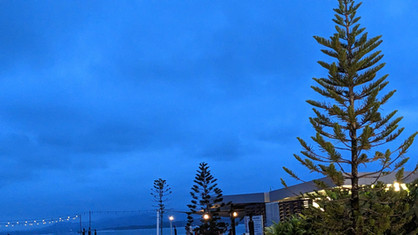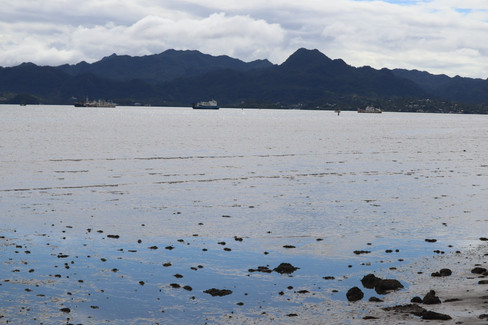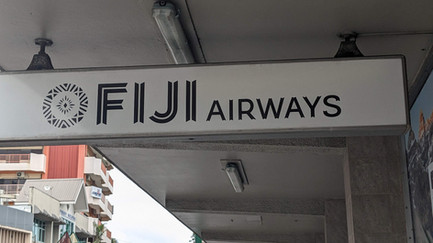With buoyant spirit, Fiji models reconciliation & a welcoming culture
- Kimberly OLeary
- May 27, 2023
- 8 min read
Updated: May 28, 2023

We've been living in Suva, Fiji, for about a month. This small archipelago nation consisting of about 330 islands in the South Pacific has a complex history and a rich culture. Suva, whose greater urban area contains over 300,000 people, is the capital and is located on the largest of the islands, Viti Levu. The entire country has about 900,000 people.
The first thing you notice about Fiji is its abundant beauty. On our arrival, we flew across the island from Nadi to Suva in a tiny plane.
Even in Suva - a kind of gritty city in a country more accustomed to rural villages, small towns, and tourist beaches - the natural beauty is evident. We are here in their winter (May-June) where they often complain it is cold on 77F days. It rains some almost every day, resulting in lush greenery, colorful flowers, and giant mangrove trees. Wildlife consists mostly of very large fruit bats, herons, Indian mynah birds that accompanied indentured laborers by ship, and bugs as tiny as the bats are large. We've also seen iguanas and frogs. We are surrounded by clouds, mountains, and ocean.
Outside the city, about an hour West, we see lush river valley, waterfalls, and traverse the ocean to an island. Palm trees with coconuts abound.
But, as beautiful as the landscape is, it is the people of Fiji that are its greatest national treasure. Aside from a couple of over-zealous street vendors in downtown Suva, our interactions have been completely positive - warm, friendly, and respectful. Everywhere we go, people greet us with "Bula!" and a big smile - even small children we pass on the street. When they discover we are visiting from America, they often say, "Welcome home," despite the fact that we look nothing like virtually everyone else in the city. We learn that the population of Fiji is about 57% indigenous iTaukei - Melanesian people descended from African people who walked into Australia over 50,000 years ago, who have mixed with Asian people. Their culture dates back about 3,500 years. About 37% of the population are Indo-Fijian - descendants of indentured laborers "hired" by British sugar companies in the late 1800's and brought to Fiji from India. The remaining 6% are a mix of European, Chinese, Polynesian and other.
This is a nation of many languages and cultures. iTaukei primarily speak a specific indigenous dialect, but there are many variations of the language. Indo-Fijians speak Hindi-Fijian. English - brought to Fiji by the British in the 18th century - is a common language spoken to some extent by everyone. All three languages are official languages of the country. Likewise, there are multiple religious traditions. While traditional iTaukei values and beliefs form a core for most iTaukei people, virtually all iTaukei are now Christians. Two-thirds of those are Methodist. Indo-Fijians are primarily Hindu, but some are Muslim, Christian, and Sikh. All iTaukei have birthright collective owenership of land in villages, and many of them live in villages with collectivist cultures. Most Indo-Fijians live in cities or small towns. More shop owners are Indo-Fijian and it appears that more service industry workers are iTaukei. Government workers and professionals draw from both cultures.
We visited an iTaukei village called Koromakawa Village about an hour from Suva. The people there are eager to explain their way of life. They engage with us in real conversation. They demonstrate song and crafts, and invite us to join in a kava ceremony and dancing before we head up the river to see a waterfall. Nem, one of the guides, says with pride that his sister's masi design was chosen by Fiji Airways as their logo. He is passionate about keeping traditional values, crafts, & customs alive and vibrant. Yet, the villagers are also modern and adaptive. They offer crafts for sale but there is no pressure. I take up an offer of an extremely reasonably priced 15-minute massage by one of the local women and it is fabulous. They are all gracious, and the boat pilot is patient with me as I struggle a bit to get in and out of the boat and climb up and down a steep trail. School boys from the village assist with the boats, and climb up the trails and rock faces with ease, jumping into the water with exuberant yells. The trip was organized by Ateca Getaway Vacation based in Nadi and Ateca was extremely organized and responsive. Our driver, Scott, tells us all about the history of the village on our way from Suva to the village.
Later that week, Ateca organizes another tour, this time a Jetski Safari in Pacific Harbour. Once again, our guide, Noni, is patient and helpful. Paul talks to a local man whose porch we are allowed to shelter in from the rain. His home overlooks the ocean, and while James, Maggie, & I snorkel, he chats with Paul about his life. His land is given to him by the village, and villagers helped him build it. He gardens, trades foods, and occasionally fishes. It is a subsistence life, but, he says, a happy one. Because we have some difficulty with the jetskis, Noni arranged for us to take boat back while James & Maggie ride the jetskis back across the ocean.
In Suva, people we have met once or twice recognize us and give us big smiles. One morning, Paul, James and I had breakfast at a restaurant about 3.5 km from our apartment. A nice young woman waited on us. Later that afternoon, I was walking back from the pool when I heard "Hi! Remember me? I waited on you earlier today." She and two co-workers were on the ocean front, nowhere near the place where we had breakfast at Grace's Kitchen. She and her friends gave me big smiles and we chatted. The people who own and work in the stores on our block are a mix of iTaukei and Indo-Fijian people. They regularly greet us with equally broad smiles and interested conversation: the women at the Victoria Wine Shop next to our apartment, the staff at the P Meghi Market, and the people at the Tasty Trails Restaurant down the street. They are a big hearted people offering quality products and services. The Suva Expats group on Facebook offered abundant advice when I posed a few questions the first week we were here. A family reaches out, meeting us for lunch. Everyone is just so nice.
Our visit has coincided with two public holidays. The first, Girmit Day, celebrated the arrival in 1879 of the first ship of Indo-Fijians' ancestors who worked the sugar cane fields and factories. These people were called Girmityas. They contracted away five years of their lives for tiny pay and long, hard work in Fiji. History judges this indentured labor as only one step away from slavery and it is no longer legal. Most of them stayed after the contract was up. The Saturday of the holiday weekend, the Methodist Church of Fiji led a service of Reconciliation and Thanksgiving for harms done to Indo-Fijian people by iTaukei people. Hundreds of people attended. I was invited by a woman I met who works for our apartment company, who was singing in the choir. I almost didn't go - I haven't voluntarily gone into a church service, except for the funeral of my aunt (who was coincidentally a Methodist minister) in years. Although raised in the Methodist and Episcopal churches as a child, then later by choice a Quaker then a Unitarian Universalist, I eventually realized I did not ascribe to any religious belief system. Although I went out of respect for my friend who was singing, I was so grateful I went. It was a great honor and privilege. It was truly remarkable, and I felt that I was witnessing history.
During the service, important national speakers told a story. In 1987, 2000, & 2006 there were coups by indigenous Fijians and many of the Girmitya descendants had rights taken from them and suffered violence. The Methodist Church is the largest church in Fiji, and is almost entirely populated with indigenous Fijian members (iTaukei). The President of the Fijian Methodist church, the current prime minister, a representative of the council of chiefs, and others, made sincere, heartfelt, personal apologies to the wrongs committed upon the Girmityas, specifying the wrongs committed against those people. Then, members of the Girmitya community, including an Indo-Fijian former Prime Minister and others, some of whom had been imprisoned by the iTaukei, accepted the apologies - but only after stating the wrongs done to them. After, they all signed an agreement to move forward together based on four points: no racism, no religious intolerance, no coups (instead democracy), no disunity. The singing was exuberant - a Methodist iTaukei choir and a Hindu singer as well. One of the iTauki speakers said to the Grimityas something to the effect that he knew they had reason to be angry with them, and even to hate them, and he understood that. He hoped they would choose to forgive him. One of the Grimitya speakers said something to the effect that yes, everything that had been described had happened to them, but many iTaukei had helped her ancestors when they were injured in the cane fields, or to understand how to farm in what was for her ancestors a foreign land; she said that the Girmtyas did not take the time to learn the iTaukei language or learn how to listen to them and, if they had, maybe the events would not have happened the way they did. Honestly, it was so moving, so healing, it gives me hope for the idea that cultures can work together, even when they have a disastrous history.
The second public holiday is this weekend - Ratu Sukuna Day. Ratu means "chief" in the iTaukei language, and he is commonly referred to as Ratu Sir Lala Sukuna (sculpture of him below), because he was knighted by Queen Elizabeth. He left Fiji in the early 20th century to study in New Zealand and Great Britain, and became a barrister. He returned to Fiji and helped mold modern government and establish a land trust that balanced interests of iTaukei and Indo-fijians. Fiji attained independence as a republic in 1970, long after he died, but his work is seen as an important building block for that step. The previous government had banned the holiday, as well as abolishing the Great Council of Chiefs. This year, I heard much jubilation as both the holiday and the GCC were brought back by the new government.

After attending the service of reconciliation, Paul and I were eating at a restaurant and heard a local musician sing "Hallelujah" by Leonard Cohen. For me, that song has always resonated both because of its haunting beauty but also because the writer seems to struggle with the nature of the Old Testament God, looking for meaning in music and, with difficulty, in relationships. It overtly touches on biblical themes. Our son, James and his wife Maggie were visiting us in Suva, and James agreed to record a version with me and my traveling ukelele. Cohen famously wrote many more verses to this song than he sang in any one concert, choosing certain ones at certain times. Cohen was a practicing Jew, and also studied Buddhism. James has been learning a lot about AI, and we thought it would be fun to write a verse that captured our version of spirituality. For us, what is all-powerful is the connections between people. When we travel and share our stories with each other, we feel a spark of humanity coursing across the globe. So the last verse is our verse, created in part with help from an AI James queried. We in no way are suggesting our verse achieves the power or poetry of the Cohen verses - rather, we see it as an homage to the power of his lyrics and his song that it speaks to we atheists as well as religious people. In 2009 (only 7 years before his death), Cohen played a concert in Israel called “A Concert for Reconciliation, Tolerance and Peace" and donated the proceeds to people working on peace between Israelis and Palestinians. This effort seems to me to come from a similar space honoring the power of human connection as the service of reconciliation and thanksgiving I witnessed in Suva.


































































































































































Fiji’s approach to reconciliation and its warm, welcoming culture is truly inspiring. It reminds me how important it is to celebrate special occasions with loved ones, just like the October Bank Holiday in Ireland, which offers a perfect time to relax, reflect, and enjoy time with family and friends.
Thank you Kim - I really enjoy your reflections and photos. And loved the rendition of Hallelujah too, with your son. Bronwyn
Could you explain birthright collective ownership of land ? Does it mean families pass land from one generation to the next?
What a beautiful convergence of happenstance! Thanks for sharing this unknown, seldom covered history, and reconciliation!